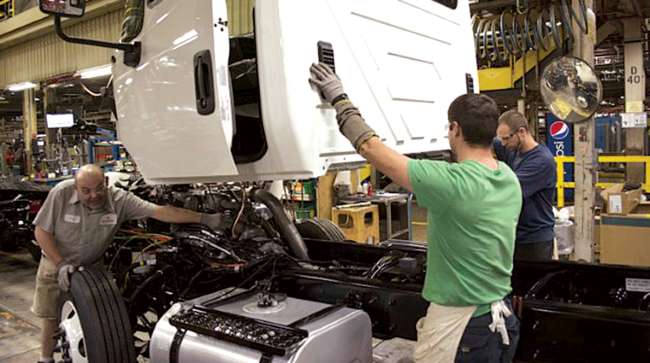Senior Reporter
February Class 8 Orders Decline

[Stay on top of transportation news: Get TTNews in your inbox.]
Class 8 orders dropped to 14,100 in February, ACT Research reported, citing preliminary results. In what typically is a weak month, fleets remained cautious amid challenging freight levels, overcapacity and the spreading coronavirus as a backdrop.
North American orders were down 16% from a year earlier when they reached 16,854. ACT will revise its estimate once truck makers finalize their reports later in the month.
ACT Vice President Steve Tam suggested February is a case of continued slowing, rather than the result of a broad wave of cancellations.
The normal sequential decline in February orders, however, is 10%, he said.
“The fact that we saw almost a 20% decline suggests that there is something going on there,” Tam said. “But I am not hearing any chatter that customers are canceling orders.”
January’s order volume reached 17,700.

Tam
But the elephant in the room, Tam said, is the industry remains overstocked with trucks, and the silver lining is a further curtailment to truck manufacturing will help get inventories corrected more quickly.
One truck maker agreed during its fiscal-year, first-quarter earnings call in March.
“There is just a lot of truck capacity right now, chasing a relatively constant number of loads, pressuring rates,” Navistar International Corp. Chairman and CEO Troy Clarke said. “This is the classic truck cycle. The freight market will still take a few more months to work through this. However, recent spot rates have stabilized, an important step, signaling capacity is beginning to adjust to demand.”
Absent a meaningful impact from the coronavirus issue, Clarke is optimistic for the economy, the industry and his company, even as Navistar reported a loss of $36 million in its fiscal-year first quarter ended Jan. 31, as revenue slipped $600 million to $1.8 billion compared with a year earlier.
“We are maintaining our 2020 guidance, as I’m confident succeeding quarters will improve sequentially,” Clarke said. Revenue is expected to range from $9.25 billion to $9.75 billion, according to the Lisle, Ill.-based truck maker. Full-year revenue for fiscal 2019 was $11.25 billion.
One fleet adjusting to the current situation is Old Dominion Freight Line Inc., which placed truck orders last year expecting greater economic activity than occurred, a top executive said.
Host Seth Clevenger went to CES 2020 to look at the road ahead for electric-powered commercial vehicles. He spoke with Scott Newhouse of Peterbilt and Chris Nordh of Ryder System. Hear a snippet, above, and get the full program by going to RoadSigns.TTNews.com.
“This will be probably a one-year holiday on the fleet side, and then we’ll just get to the end of this year and sort of evaluate where we are and what we feel like we need going into 2021,” Old Dominion Chief Financial Officer Adam Satterfield said during the carrier’s fourth-quarter earnings call in February.
“We made orders last year anticipating kind of mid-single-digit growth. On the volume side, we ended up with a mid-single-digit decrease in tonnage. So, we’re probably a little bit heavy, and there’s a lot of carrying costs both in the depreciation line as well as the maintenance and repair cost on that heavier fleet. So, hopefully, we will grow into the fleet as we progress through 2020,” he said.
Old Dominion ranks No. 9 on the Transport Topics Top 100 list of the largest for-hire carriers in North America.
The Thomasville, N.C.-based less-than-truckload carrier operated about 9,200 tractors in 2019.
Meanwhile, FTR pegged the orders at 14,100, too.
“Too low, below expectations. I think this is one of the best signals of the coronavirus’ impact on the economy,” said Don Ake, FTR’s vice president of commercial vehicles.

Ake
The orders should have been in the 17,000-to-20,000 range, he suggested, as orders were in the fourth quarter of 2019.
“[But at 14,100], it wasn’t like nobody ordered,” he said.
At the same time, it was the worst February for heavy-duty orders since the impact of the Great Recession, he said. “So we have a shock to the market. Coronavirus is definitely going to have an impact short-term.”
Bloomberg News reported International Monetary Fund Managing Director Kristalina Georgieva said the global economic outlook has shifted to “more dire scenarios” as the coronavirus has spread undetected, though she added that it’s still difficult to predict the impacts.
Georgieva said the virus demands a global response as it affects significant elements of supply and demand, and IMF member nations are committed to coordinated action. She said that IMF is confident that global growth this year will be slower than 2019, when growth was 2.9%, according to Bloomberg.
IMF previously had seen 2020 growth accelerating to 3.3%.
Clarke during the earnings call noted U.S. gross domestic product is projected to grow around 2% in 2020.
“That’s the basis of an industry at replacement demand,” he said.
Want more news? Listen to today's daily briefing:




